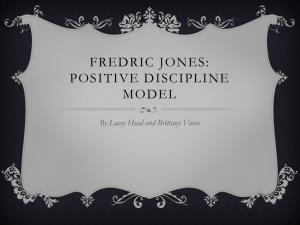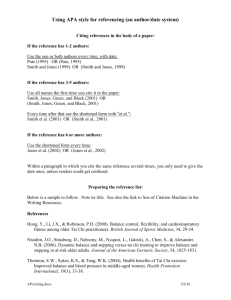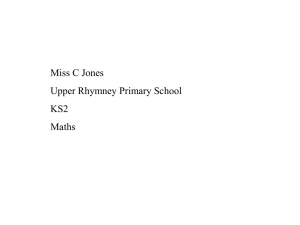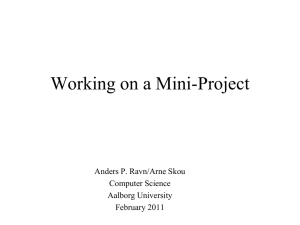Harry Frankfurt talks about alternate possibilities and moral
advertisement
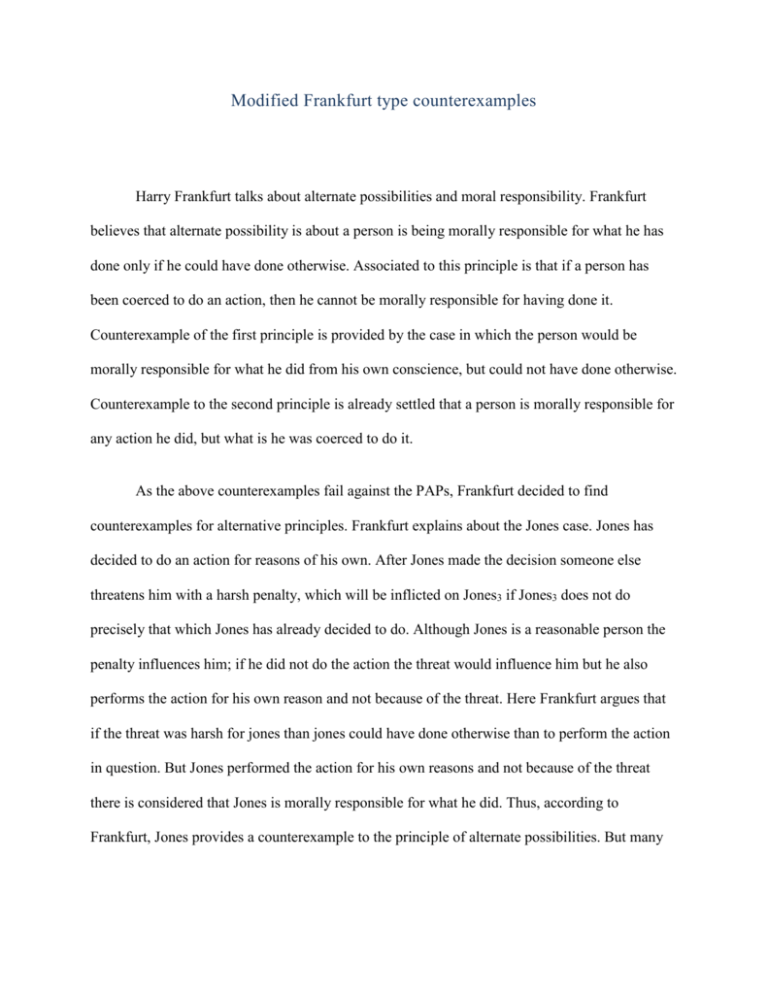
Modified Frankfurt type counterexamples Harry Frankfurt talks about alternate possibilities and moral responsibility. Frankfurt believes that alternate possibility is about a person is being morally responsible for what he has done only if he could have done otherwise. Associated to this principle is that if a person has been coerced to do an action, then he cannot be morally responsible for having done it. Counterexample of the first principle is provided by the case in which the person would be morally responsible for what he did from his own conscience, but could not have done otherwise. Counterexample to the second principle is already settled that a person is morally responsible for any action he did, but what is he was coerced to do it. As the above counterexamples fail against the PAPs, Frankfurt decided to find counterexamples for alternative principles. Frankfurt explains about the Jones case. Jones has decided to do an action for reasons of his own. After Jones made the decision someone else threatens him with a harsh penalty, which will be inflicted on Jones3 if Jones3 does not do precisely that which Jones has already decided to do. Although Jones is a reasonable person the penalty influences him; if he did not do the action the threat would influence him but he also performs the action for his own reason and not because of the threat. Here Frankfurt argues that if the threat was harsh for jones than jones could have done otherwise than to perform the action in question. But Jones performed the action for his own reasons and not because of the threat there is considered that Jones is morally responsible for what he did. Thus, according to Frankfurt, Jones provides a counterexample to the principle of alternate possibilities. But many objections were put forward regarding these counterexamples; the counterexamples were attacked by those who believed it depended on the falsity of incompatibilism. Frankfurt devised another case of the Jones as a response back to the above objection. He explains, a person named Black wants Jones to perform a certain action. If Jones performs that certain action then Black will not do anything. If Jones does not perform the action that Black has asked him to then Black will take measures to ensure that Jones change his mind. Frankfurt believes that for this theory Jones could not have done otherwise, but is still responsible for the action. If this is true then no matter how everybody defines otherwise, it will be a possible successful counterexample to the principle of alternate possibilities. As Frankfurt’s counterexample has recently come in attack by those who believe that the counter example depends on the falsity of incompatibilism. In this paper I will compare how Michael Robinson modifies Frankfurt’s counterexamples and how Michael Bergmann argues that there are counterexamples to PAP that don't take the falsity of incompatibilism for granted. Bergmann’s aim is to establish a Frankfurt-style counter example to PAP that doesn't take falsity of incompatibilism for granted. He explains that freedom and responsibility are unsuitable for determinism and the involvement of the causation agent. Incompatibilist theorists believe in true theory and genuine responsibility; whereas compatibilists are the opposite. Therefore Bergmann raises the question about the existence of a Frankfurt-style counterexample to PAP that doesn't assume the falsity of the incompatibilist agency theorist's position, questioning their moral responsibility. Robinson explains how Frankfurt’s counter examples to the Principle of Alternative Possibilities (PAP) depend on the presence of a perfectly reliable indicator. Robinson implies this indicator as a prior sign of what an agent will freely do if Jones is left to act on his own. Therefore, he questions which indicators guilty of begging the question against incompatibilists, since such indicators accept the deterministic relation between an agent’s free action and its casual antecedents. One of the main problems identified from the perspective of an incompatibilist theorist is regarding how Black could make Jones perform an action by threatening him with certain circumstances. Therefore the question raised here is if Jones o black is the cause of the action Jones acts upon. It is valid to think that Jones takes the responsibility as he acts on the action himself. So it is based upon his choice. But the main cause why incompatibilist object is due to the following understanding: It is correct to say that jones is morally responsible as he performs the act and he is the cause of it. But if Black is involved causing the act by forcing it upon to Jones then Jones is not believed to do the act himself, he is instead performing due to pressure. Thus above due to the nature of the two different agents causing the action, it is not effective to imply Jones as the agent-cause of the action by himself. Therefore, portraying how Frankfurt’s description of the case is incoherent as it is making the readers assume that it is possible for black to be the cause of Jones to perform the act. Bergmann’s explanation of the causation agent in as follows: Given AC. X is the agent cause of e iff each of the following three conditions is satisfied: 1. X is a substance that had the power to bring about e 2. X exerted its power to bring about e 3. nothing distinct from X (not even X's character) caused X to exert its power to bring about e Therefore, the above explains that given AC, therefore, X seems to be the agent of the cause in order for e to be an act of e’s. Thus, this concludes that no Black can cause X to cause e if e is an act of X'S. The way Bergmann proposes to solve this causation agent problem is by implying that the agent cannot do otherwise. We then have to understand that the agent in the counterfactual situation is not forced to perform the act that in the actual situation he is willing to perform. To prove this we need to explain that the agent cannot agent cause anything other than what he agent-causes in the actual situation. Thus, Black carries only temporary power to take away Jones powers to perform an action. In this case Jones will not be able to perform the act nor could he refrain from performing it. Thus only for a temporary period, Jones will be unable to exercise his powers to act upon the action. If the action is based upon choice or desire and Black’s plan is for Jones is to pull the trigger of the gun in Jones hand. If Jones performs this act at a period of time, Black will not intervene but if Jones refrains from the action then Black will take the powers off Jones which is implying that Black takes the gun and the power from Jones and performs the act himself by pulling the trigger in the counterfactual situation. Thus this portrays that Black is not causing Jones to be the agent cause but instead Black takes away these powers from Jones and Black himself causes the action. Hence, Jones is unable to do otherwise in the counterfactual situation as Black take away the powers and pulls the trigger himself therefore representing the causation agent. This helps removing the incoherent causing of agent causation from the counterfactual situation. Another problem observed by Bergmann is the prediction problem. This problem here questions the claim that unless Black intervenes, Black must already assume Jones’s action in the situation. Black must be observing Jones’s behavior carefully prior to time t. Therefore Black can predict if Jones will be able to perform the action that Black wants him to do it at time t. Supposedly in this case Black wanted to pull the trigger at time t and kill Smith. Now, if there was a sign that black observed on Jones that explained that Jones would kill Smith otherwise even if Black did not intervene him to do this action. Thus in this case, Jones here is responsible for the action he acts upon as he is doing it from his own desire. But if the sign prior to t was just a casual determination made by Black determining that Jones’s temptation is to kill Smith at time t then it is not Jones’s act which is Jones’s responsible. Jones is not responsible as he is not the agent cause of the action. As the sign could be arbitrary it is just a casual determination that gave the sign to Black that Jones’s temptation is to kill Smith without intervention by Black. Therefore this explains how there is a problem between the causation and prediction in the situation trying to cause someone to agent-cause. Bergmann introduces the “Molinist” as a Frankfurt style counterexample. It involves knowledge of subjunctive conditionals of agent causation. Some philosophers suggest that as there is a possible for knowledge to exist; existence of middle knowledge could also be possible. Some philosophers object against the existence of middle knowledge as they do not believe if there exists subjunctive conditionals of freedom to be true unless an agent causes the free actions. If there really existed a middle knowledge then the philosophers would believe that subjunctive a conditional of the agent cause exists as well. Bergmann points out the information about the middle knowledge to point out that there are true subjunctive conditionals of agent causation. This seems to be at least as plausible as the view that there are true subjunctive conditionals of freedom. Therefore, Molinism can help can solve the prediction problem. The prediction problem arose because the intervener was supposed to know in advance what Jones would do the action if there were no intervention. Bergmann write, “ In knowing prior to t what Jones would do at t if there were no intervention, it seemed the intervener had to have knowledge that some event prior to t would cause Jones to perform a certain act at t if there were no intervention.” But since Frankfurt’s counterexample question who is the causation agent; It is impossible for the Black to know in this way what action Jones would do at t. However, if Black had prior knowledge of the subjunctive conditionals of agent-causation true of Jones, then Black would have had the ability to predict what Jone’s temptation is at t. In Robinson’s paper, Robinson explains the problem that exists in Frankfurt’s counter example; the counterfactual intervener is able to know what the agent will freely do if left to act on his own. Thus this raises the question if Black intervening depends on whether Jones shows some indication that he will not freely decide on his own to take the action. But the question what kind of indication would Jones express for Black to understand Jone’s intentions. Supposedly, Black knows that if Jones blushes at some point prior to noon, then at noon Jones will freely decide to set the place ablaze. In this case, Jones’s blushing will represent the prior sign to Black to what Jones would do without any intervening necessary from Black. But the confusion rising here is argues upon the truth that if Jones blush how does it prove that he would set the post office to fire. If Jones’s blushing is a knowing fact from the earlier on that he would set the blaze, then it is his own responsible and fault to put the blaze on the building. As this explains that he will be the causation agent. But jones could hold alternate possibilities; therefore, his bearing moral responsibility for his actions could not possibly pose any threat to PAP. Robinson still questions if Jones should hold the actions committed by Jones morally responsible. Robinson counterexample to PAP explains it as follows: (i) (ii) (iii) an agent S does something A S is morally responsible for doing A, and S could not have done otherwise than A. A is fixed in the above. From the above it portrays that no matter what action S have done he is morally responsible as he could not have done otherwise. Thus this seems to explain that the action that S acts upon and for which S is morally responsible must be the same action that S could not have avoided from doing. Robinson tries to understand if Jones is really morally responsible for setting fire to the post office or was it something else!!! In Frankfurt’s counterexamples, the scenario is set up in a way where regardless what action Jones acts upon, it results in the same outcome. Frankfurt claims that Jones could not have done otherwise. Robinson compares Frankfurt’s counterexample with an analogy of ‘Box’. He explains the idea of a large box that represents the world created by an evil demon. It contains a single human being named Jack. If the box is created in a way it is impossible for Jack to ever get out of this box world. Jack’s whole life is set within an box and he dies living in it over time. From the above, it can be understood that it is sufficient to claim that Jack from being morally responsible for the fact that he stays inside the box. Jack has no control over being stuck in this small box world. But in this case, it is clear that we cannot hold Jack morally responsible for staying in the box and not coming out of it as he has no control of it. This does not explain that he is not morally responsible for any actions he acts upon. There are actions and circumstances he could possibly be morally responsible for but these are also based upon assumptions. For example, Jack would have never made any effort to get out of the box if he had the knowledge that it is physically impossible for him to get out of the box. If Jack did not have the knowledge that it was physically impossible; but still did not make any efforts to get out of the box; then he would he held morally responsible as he would not try to get out of the box due to his own choice. This same explanation is true for Frankfurt’s counterexamples. Within Frankfurt’s case one could argue Jones is morally responsible for setting the post office a blaze on his own, not for setting the fire simpliciter. Jones is not morally responsible for blazing the post office because of the presence of the simpliciter is because things were behind Jones control. As the case of post office being set on fire was set in a way where it should be set up in fire no matter what choice Jones made. Hence, this is the reason why Jones should not be morally held responsible for the action as he had no control over the whole situation set up. The following setup of this Frankfurt counterexample establishes the disjunction. Jones’s own choice is to set fire to the post office or Black intervenes him to act upon this action; regardless what effort he does to make the choice otherwise, Jones will blaze up the post office. This disjunction portrayed above is true, as within the example Jones could not have done anything to falsify the disjunction. As the truth value of disjunction is entirely out of his is control, it would be unreasonable to hold Jones morally responsible for blazing the post office. But Jones is necessarily responsible for determining which of the disjunction act outcome ends up making the disjunction the true. If the post office was on fire without any interference actions from Black then it could be brought up true that the first disjunction is false and this forces Black to intervene Jones to perform the action therefore making disjunction true. In all the Frankfurt cases, Jones makes the first disjunction true without any intervening from Black. This shows that Jones acts from his own choice, therefore here it would be possible to exclaim that Jones is morally responsible for the action. But if Jones setting fire to the post office is compared with the case of Jack being stuck in the box all his life, one can learn that both these cases are guaranteed to establish the same outcome prior to do anything Jones acts upon at the end of the situation no matter what Jack or Jones does otherwise. Jones’s actions are not similar to Jack’s, as Jones sets up fire without any intervention from Black. But it seems Jones could be considered morally responsible. Robinson writes that Frankfurt himself was quick to observe that it is Jones’s power to set a fire or not set a fire to the post office. Frankfurt writes, ‘‘Of course it is in a way up to [Jones] whether he acts on his own or as a result of Black’s intervention. That depends upon what action he himself is inclined to perform. But whether he finally acts on his own or as a result of Black’s intervention, he performs the same action’’ (1969, p. 836). From this it is understood that although Jones is considered morally responsible for setting fire to the post office on his own, it was also possible for Jones to not do such an action. And if it was understood that it was not within his power to prevent himself from setting fire to the post office, then he should not be held morally responsible for the action. Therefore, from all this understand all Frankfurt-type scenarios failed to provide us with cases of causation agents who really are morally responsible for acting upon an action that could have been avoided doing it. Therefore this case fails to provide us effective grounds for rejecting PAPs. Therefore both the authors tries to show that Frankfurt-type counterexamples have been reformulated in a way that no longer begs the question against incompatibilists by relying on prior signs that presuppose a deterministic relation between an agent’s free action and its antecedents, they are still unable to do the work set out for them. For Robinson’s paper, he used examples like Box was explained well in order to provide plausible grounds for denying that Jones is at all morally responsible for making a choice to set fire to the post office. Making assumptions like this also proves to be wrong. Those agents in these cases act on their own, just as they would have had no ensuring mechanism been in place. Whereas the main conclusion in Bergmann’s paper that there is a Frankfurt-style counterexample to PAP that doesn't assume the falsity of incompatibilism: He explains the two difficulties presents within Frankfurt’s counterexamples to PAP.




